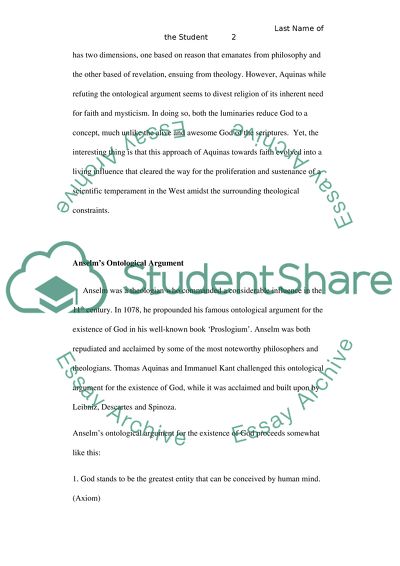Cite this document
(Evaluation of Aquinas's Criticism on God's Existence and Self-evidence Term Paper Example | Topics and Well Written Essays - 1500 words, n.d.)
Evaluation of Aquinas's Criticism on God's Existence and Self-evidence Term Paper Example | Topics and Well Written Essays - 1500 words. https://studentshare.org/philosophy/1516307-great-works-of-western-philosophydiscuss-thomas-aquinass-criticisms-of-the-view-that-gods-existence-is-selfevident
Evaluation of Aquinas's Criticism on God's Existence and Self-evidence Term Paper Example | Topics and Well Written Essays - 1500 words. https://studentshare.org/philosophy/1516307-great-works-of-western-philosophydiscuss-thomas-aquinass-criticisms-of-the-view-that-gods-existence-is-selfevident
(Evaluation of Aquinas's Criticism on God'S Existence and Self-Evidence Term Paper Example | Topics and Well Written Essays - 1500 Words)
Evaluation of Aquinas's Criticism on God'S Existence and Self-Evidence Term Paper Example | Topics and Well Written Essays - 1500 Words. https://studentshare.org/philosophy/1516307-great-works-of-western-philosophydiscuss-thomas-aquinass-criticisms-of-the-view-that-gods-existence-is-selfevident.
Evaluation of Aquinas's Criticism on God'S Existence and Self-Evidence Term Paper Example | Topics and Well Written Essays - 1500 Words. https://studentshare.org/philosophy/1516307-great-works-of-western-philosophydiscuss-thomas-aquinass-criticisms-of-the-view-that-gods-existence-is-selfevident.
“Evaluation of Aquinas's Criticism on God'S Existence and Self-Evidence Term Paper Example | Topics and Well Written Essays - 1500 Words”. https://studentshare.org/philosophy/1516307-great-works-of-western-philosophydiscuss-thomas-aquinass-criticisms-of-the-view-that-gods-existence-is-selfevident.


